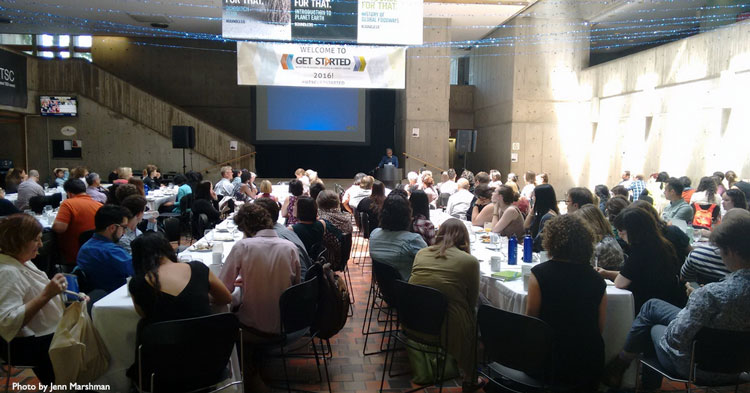Canadian Association for Food Studies panel on food policy and social transformation
Canadian Association for Food Studies panel on food policy and social transformation sets the stage for thinking ‘big’ when addressing key challenges facing our food system in Canada.

By Peter Andrée, Associate Professor of Political Science at Carleton University, Ottawa, Ontario
In late June I had the pleasure of sitting in the front of a packed room at the Scarborough Campus of the University of Toronto, alongside my colleague Prof. Irena Knezevic, to co-chair a talented panel of four scholar-activists thinking through some of the big food policy questions. I came away from the panel with a reminder that as our federal government begins to develop its first national food policy, the processes employed will be as important as the principles it will be based on.
Transforming societies through Food Governance Innovation
Our panel was based on an ambitious idea: Food can be portal through which to enhance social justice, create more prosperous economies, support ecological stewardship, and make the potential for participatory democracy apparent. This idea lies at the heart of a globally-connected research project entitled FLEdGE (for “Food: Locally Embedded, Globally Engaged”) that all six of us are connected to (https://fledgeresearch.ca/ ). Our panel was intended to critically consider a range of governance innovations emerging around the world that are beginning to transform political and economic systems through food. Panelists were invited to address several big questions, including:
- How have you seen specific food governance innovations contribute to broader progressive economic, political, or cultural transformations?
- How do innovative food governance efforts you are familiar with strike the balance between working on the economic, environmental, and social sustainability of food systems?
- What lessons can we learn from these other cases to apply to Canada’ effort to build a National Food Policy, and the work of Food Secure Canada to coordinate civil society engagement in that policy-making effort?
Process Matters
Our conversation was ostensibly about what should be in food policies, but we spoke at least as much about process. Prof. Jill Clark from Ohio State University is well versed in the experiences of building local food policy councils. She emphasized the point that food policy–making is ultimately about co-learning between governments and the people they represent. As a result, it is absolutely essential to generate policies through community engagement processes that allow the co-learning to take place.
In her remarks, Dr. Lauren Baker, Health Policy Specialist with the Toronto Food Policy Council and Toronto Public Health's Food Strategy Team, also spoke to questions of process, emphasizing the value of partnerships across organizations, governments and sectors to address food-related issues. She specifically pointed to the transformative impacts of partnership-based policy work at local levels, using the examples of the Milan Urban Food Policy Pact, Toronto’s poverty reduction strategy, and the GrowTO Urban Agriculture Action Plan as examples she knows inside and out.
For her part, Prof. Molly Anderson from Middlebury College in Vermont drew on her experience with the Farm-to-Plate initiative in Vermont, and also about her work with the Committee on World Food Security. She also emphasized the transformative potential of policy initiatives based in truly inclusive deliberation.
Sasha McNicoll from Food Secure Canada was our fourth panelist. She also spoke about process, and specifically about the idea of developing a national food policy council in Canada. Food policy will be something that needs constant updating, and it will require partnerships. A national food policy council will offer the government an ongoing advisory body.
Principles and the PFPP
The panel spoke about the principles necessary to underpin a national food policy to some extent, but I learned most about this topic from the audience. I was taken to task, as chair, for asking a question about whether sustainability efforts are striking the ‘right balance’ between the environmental, social and economic dimensions of food issues. These are all of equal importance, several audience members noted, and to talk of a ‘balance’ assumes that trade-offs need to be made. One audience member -- from Australia no less – reminded all of us that we don’t need to start from scratch to identify the principles upon which to build a food policy in Canada. That work was done not long ago, through the People’s Food Policy Project (PFPP). The PFPP was built on the Nyeleni declaration of food sovereignty, and in fact contributed a seventh principle to the Nyeleni Declaration’s six by articulating the principle of ‘food as sacred’ drawing on the indigenous voices who participated in the PFPP process.
It was good to be reminded by a visitor to our country that we already have a strong set of principles upon which to build a national food policy in Canada through the work of the PFPP. It was also good to hear so clearly from our panelists that process matters as much as principles. I look forward to continuing to be part of the conversations on how to build a national food policy in Canada. For me, that includes participation at the FSC Assembly in Toronto in October, where I plan to facilitate another conversation on this topic with some of the key actors on the national food policy scene.
- Log in to post comments

